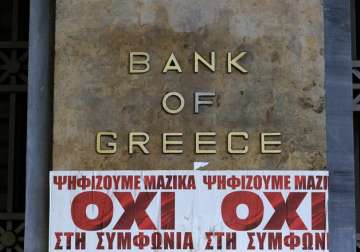Athens: Greece is set to vote in a referendum on Sunday to decide whether to accept the debt draft deal with international creditors to restart financial aid to the country, or to reject the lenders' programme that requires Greeks to accept further austerity measures and economic reforms.
According to the International Monetary Fund (IMF), the Greek debt load is unsustainable and Greece needs a debt relief in exchange for reforms and a new 50-billion euro ($5.5 billion) financing package until 2018 to stay afloat.
Greek Prime Minister Alexis Tsipras has urged a "No" vote from citizens, saying it would strengthen the government's hands in debt talks with creditors. "I call on you to say again a big and proud NO to ultimatum," Tsipras said on Saturday while addressing a rally in favour of the "No" vote that was staged in front of parliament.
Earlier on Thursday, in an interview with local private television channel ANT1 the Leftist leader said he was confident that the reforms-for-cash debt deal Greece has been seeking for five months with creditors will be reached within 48 hours after Sunday's referendum regardless of the result.
However, European leaders say that such a result may well lead to Greece's exit from the Eurozone.
If Greek voters refuse the proposal of the troika institutions (the European Commission, the European Central Bank and the International Monetary Fund), negotiations would enter a truly "unknown area", French Finance Minister Michel Sapin warned on Thursday. He added that it could also lead to Greece's exit from the Eurozone.
European Commission President Jean-Claude Juncker also issued a similar warning on Friday when he said in Luxembourg that the Greek government's position will be "dramatically" weakened in negotiations with creditors if the Greeks vote "No" in the referendum.
But Tsipras rejected the warnings on Saturday, saying, "On Sunday we do not only decide to stay in Europe, we decide to stay as equals among equals in Europe."
Opinion surveys show that Greeks are almost evenly divided heading to the referendum. An Ipsos survey put "Yes" supporters at 44 percent and "No" at 43 percent, according to BBC.
The left-wing Greek government was elected in January this year on an anti-austerity and anti-bailout agenda.
The European Commission, the European Union's executive arm -- one of the "troika" of creditors along with the IMF and European Central Bank -- wants Athens to raise taxes and slash welfare spending to meet its debt obligations.
On June 30, the previous eurozone bailout expired, depriving Greece of access to billions of euros in funds, and Athens missed a 1.5 billion euros ($1.7 billion) repayment to the IMF, making Greece the first developed nation in arrears status for the Fund.
Latest World News

